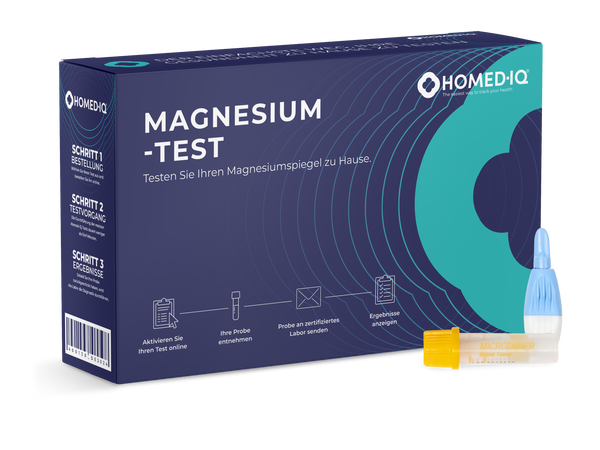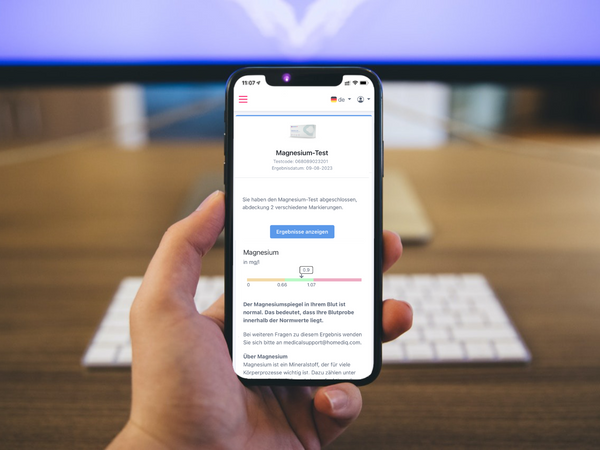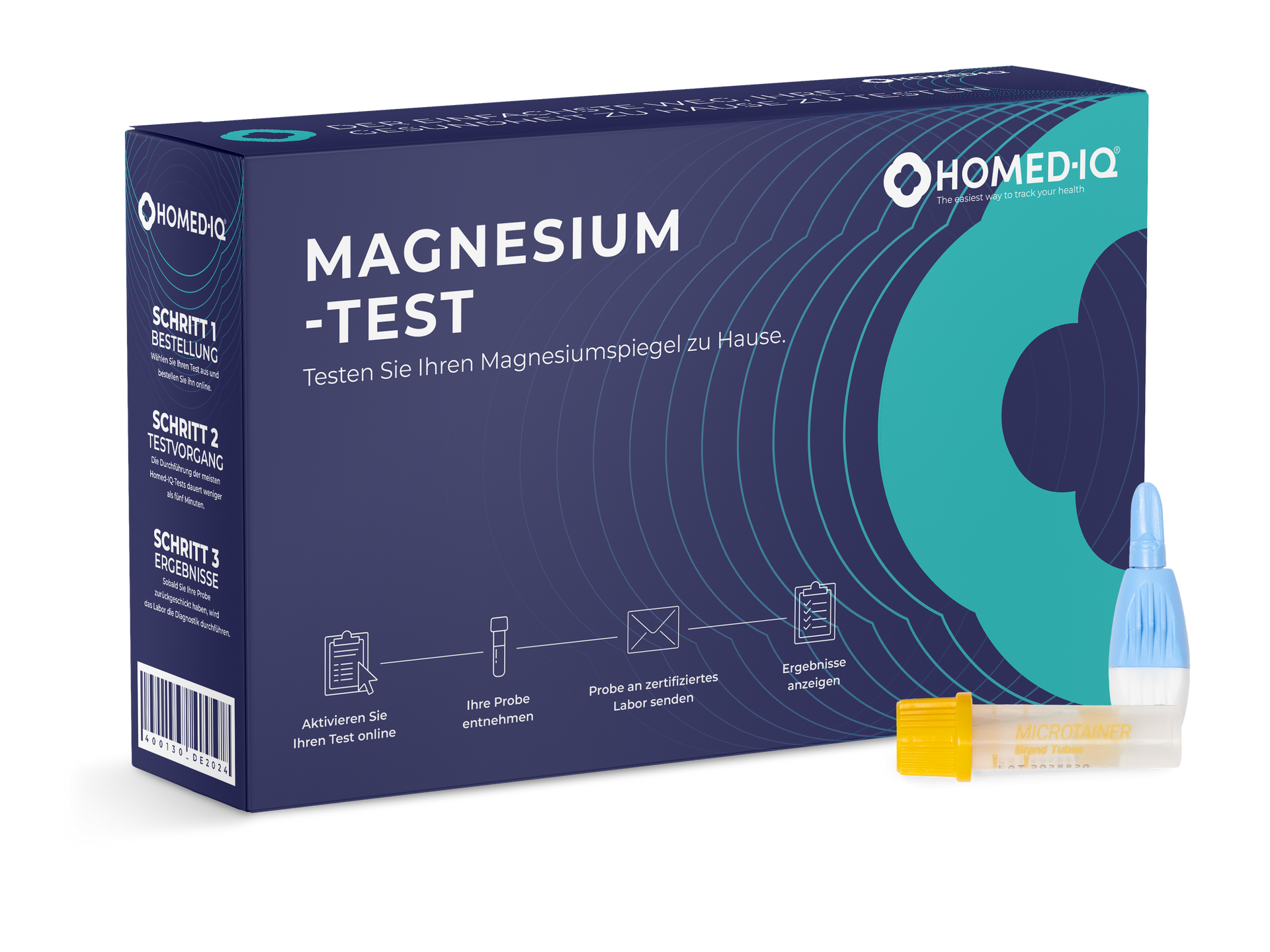Magnesium Test
FREE SHIPPING TO
As one of the most abundant minerals in the human body, magnesium plays a crucial role in the normal function of cells, nerves, muscles, bones, and the heart. Abnormal levels of magnesium—whether too high or too low—can lead to a range of health issues, unpleasant symptoms, and a negative impact on your daily life. This finger prick blood test checks the level of magnesium in your blood from the comfort of home.
Test mode:
Finger Prick test
How does Homed-IQ’s Magnesium Test work?
This test measures the concentration of magnesium in the blood. After collecting a small blood sample via a finger prick, send your sample to one of Homed-IQ’s partner laboratories for analysis. Your test results will be sent to your online account within a few days, complete with a laboratory report that can be brought to your GP for followup.
How do I collect my sample for the Magnesium Test?
This is a finger prick blood test. Your test kit contains all the necessary materials to collect your sample. If you would like to see a step-by-step demonstration of how to take a blood sample using a Homed-IQ test, watch our instructional video.
What’s in the test kit?
This test kit contains instructions for use, lancets for collecting a few drops of blood, a blood collection tube, alcohol wipes, band-aids, a protective transport bag and a return envelope to send your sample to our certified laboratory.
What is the Homed-IQ test process like?
Homed-IQ’s vitamin tests come with everything you need to successfully take a blood sample at home. Simply activate your test and follow the provided instructions to successfully collect the sample and then send it to our certified laboratory using the prepaid shipping label. The results will be available within a few days.
What do the results of this test mean?
Magnesium Deficiency
Magnesium deficiency can be caused by different factors. If your magnesium level is low, see your GP. While some people can simply make changes to their diet to replenish their magnesium levels, others may require supplements or have another underlying condition that is causing the deficiency.
To boost your magnesium levels through diet, eat more foods that contain it. These foods include:
- Almonds
- Spinach
- Pumpkin seeds
- Dark chocolate
- Quinoa
- Chia seeds
- Peanuts
Sufficient Magnesium
A magnesium level above 0.66 mmol/L and below 1.07 mmol/L is sufficient.
Elevated Magnesium
Elevated magnesium is uncommon as excess amounts of this mineral from diet are usually removed from the body by the kidneys. Elevated magnesium could be due to:
- Kidney failure
- Addison’s disease
- Hypothyroidism
- Excessive use of antacids or laxatives containing magnesium
- Overconsumption of supplements
If your magnesium level is elevated, see your doctor immediately. If you are taking supplements or laxatives containing magnesium, consider stopping their use.
How soon will I receive the results of this at-home vitamin test?
Once you have taken your blood sample and sent it to our medical partner laboratory, it should take a few working days to receive your test result. As soon as your test kit arrives at the laboratory you will receive a notification by email. Once your test result is ready, you will receive a text message and an email with a link to your result. Homed-IQ aims to keep you well informed throughout the testing process and provide a seamless testing experience.
Magnesium
Magnesium is a mineral that is important for many body processes, including muscle and nerve function, blood pressure regulation, and the creation of bones and DNA. Magnesium is also linked to improved muscle performance and assists in muscle relaxation and recovery.
Magnesium deficiency can weaken your bones, cause fatigue and sleepiness, create muscle tremors and spasms, and even increase your risk of heart arrhythmias (irregular heartbeats) and palpitations. Studies have shown that the more active you are, the more magnesium you need. A magnesium test indicates whether you have enough magnesium from your diet or whether you could benefit from supplementation.
Deficiency symptoms
A slight magnesium deficiency may cause no symptoms at all. Very low magnesium levels may cause:
- Heart palpitations
- Numbness or tingling in the legs or hands
- Nausea
- Headaches
- Muscle twitches and cramps
Toxicity symptoms
Having too much magnesium in the body is also known as hypermagnesmia. Mild cases of hypermagnesemia might not cause any noticeable symptoms. However, as magnesium levels rise, symptoms can include:
- Nausea and Vomiting
- Flushed face
- Headache
- Lethargy
- Hypotension (low blood pressure)
- Irregular heartbeat
- Muscle weakness
In severe cases, excessively high levels of magnesium can cause serious complications like difficulty breathing and cardiac arrest. To avoid excessively high levels of nutrients like magnesium, always consult a healthcare professional before taking any new supplements and avoid excessive use of medications that contain magnesium.
How does it work?
Order your test
Fast and discrete letterbox delivery
Activate & take your sample
Video instructions included
Laboratory analysis
ISO - Certified lab network
Receive your results
Easy access through mobile








